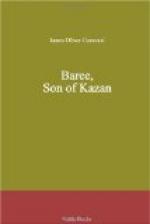Impelled by the wild alarm of the Willow’s terrible cries and the sight of Pierrot dashing madly toward him from the dead body of Wakayoo, Baree did not stop running until it seemed as though his lungs could not draw another breath. When he stopped, he was well out of the canyon and headed for the beaver pond. For almost a week Baree had not been near the pond. He had not forgotten Beaver Tooth and Umisk and the other little beavers, but Wakayoo and his daily catch of fresh fish had been too big a temptation for him. Now Wakayoo was gone. He sensed the fact that the big black bear would never fish again in the quiet pools and shimmering eddies, and that where for many days there had been peace and plenty, there was now great danger. And just as in another country he would have fled for safety to the old windfall, he now fled desperately for the beaver pond.
Exactly wherein lay Baree’s fears it would be difficult to say—but surely it was not because of Nepeese. The Willow had chased him hard. She had flung herself upon him. He had felt the clutch of her hands and the smother of her soft hair, and yet of her he was not afraid! If he stopped now and then in his flight and looked back, it was to see if Nepeese was following. He would not have run hard from her—alone. Her eyes and voice and hands had set something stirring in him; he was filled with a greater yearning and a greater loneliness now. And that night he dreamed troubled dreams.
He found himself a bed under a spruce root not far from the beaver pond, and all through the night his sleep was filled with that restless dreaming—dreams of his mother, of Kazan, the old windfall, of Umlsk—and of Nepeese. Once, when he awoke, he thought the spruce root was Gray Wolf; and when he found that she was not there, Pierrot and the Willow could have told what his crying meant if they had heard it. Again and again he had visions of the thrilling happenings of that day. He saw the flight of Wakayoo over the little meadow—he saw him die again. He saw the glow of the Willow’s eyes close to his own, heard her voice—so sweet and low that it seemed like strange music to him—and again he heard her terrible screams.
Baree was glad when the dawn came. He did not seek for food, but went down to the pond. There was little hope and anticipation in his manner now. He remembered that, as plainly as animal ways could talk, Umisk and his playmates had told him they wanted nothing to do with him. And yet the fact that they were there took away some of his loneliness. It was more than loneliness. The wolf in him was submerged. The dog was master. And in these passing moments, when the blood of the wild was almost dormant in him, he was depressed by the instinctive and growing feeling that he was not of that wild, but a fugitive in it, menaced on all sides by strange dangers.




